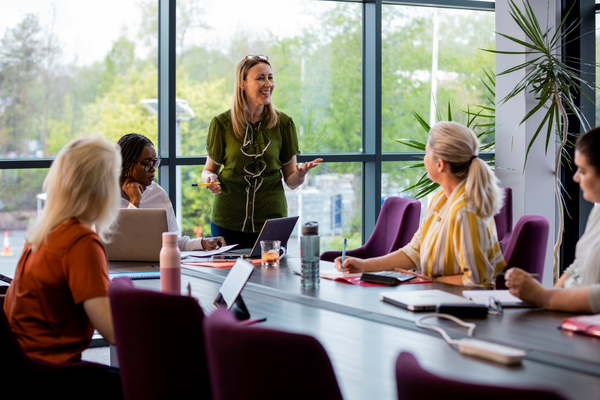Developing a culture that will embed a digital-first approach: Lessons from Wigan Council's Leadership
Recently we were thrilled to host a webinar with Alison McKenzie-Folan, the Chief Executive of Wigan Council, who shared her insights into the council's efforts to curate a digital-first approach within its internal operations and external interactions with the community.
In the following article, we look at some of the key insights provided by Alison, concentrating on the main elements of Wigan Council's digital transformation strategy. These include the focus on tools designed with people in mind, the enabling power of AI, the critical need for teamwork, and the necessity of customising the transformation process to address the needs of both the community and the staff.
The primacy of people in digital evolution
Central to the digital transformation is a focus on, and dedication to, its community. Alison articulated the council's guiding principle in this area: technology is viewed as a tool to achieve broader objectives, rather than the objective itself. The primary goal is to improve the living standards and service provision for its residents, an ambition that requires a thorough comprehension of and engagement with the community's wants and expectations.
Therefore the council prioritises inclusiveness, making sure that digital progress is both achievable and advantageous to everyone. This approach encourages a feeling of ownership and active involvement among both the residents and the staff of Wigan. Consequently, it is paramount that the council involves a wide range of stakeholders from divergent backgrounds into the process, thereby facilitating a transformation journey that can be truly based around its people.
AI as a catalyst for change
AI often elicits divergent views, with opinions split between viewing it as a boon or bane for humanity. Alison, however, sees it as a pivotal element in the council's transformation. Contrary to the notion that AI is primarily a job eliminator, Wigan Council view it as an enhancer of human capabilities.
Looking specifically at the application of AI in the field, Allison focused on the role it is already playing within adult social care. By automating administrative tasks, AI allows social care professionals to dedicate more time to the human aspect of their work, developing deeper and better relationships and enhancing their personalised care. The use of AI in recording, minute-taking, and sentiment analysis within adult social care not only improves operational efficiency but also ensures that services are more responsive and tailored to individual needs.
This vision demonstrates how AI can be a powerful tool in transforming social care, making it more effective, efficient, and, importantly, more humane. This focus on ethical considerations and the importance of staff feeling secure in this technological transition highlights a balanced approach to innovation, where advancements are made with care, responsibility, and an unwavering focus on the wellbeing of both the service users and providers.
Cultivating a collaborative ecosystem
What was also apparent throughout, was the benefit of a collaborative strategy. Alison points out that adopting a digital-first mentality goes beyond merely internal council operations, it also involves forging alliances with external entities, such as the NHS.
Such collaborations are essential for aligning on mutual objectives, optimising the utilisation of resources, and generating innovative solutions. This cooperative spirit facilitates the dismantling of obstacles, enhances cross-sector learning, and encourages the development of solutions that effectively serve the entire community.
These alliances can also extend to collaborations with trusted recruitment partners. By working with those that deeply understand the priorities enables more effective resourcing. This ensures that councils are well-equipped to undertake the digital advancements required. This in turn not only accelerates the digital transformation but can also strengthen the ecosystem through shared knowledge and mutual support.
Responsive and informed transformation
A notable feature of Wigan's approach is its attentiveness to the needs of its constituents. Digital initiatives are not arbitrarily introduced, they are thoughtfully developed through sustained dialogue and active engagement with the community.
This method ensures that digital solutions are not only advanced in technology but also align with the cultural and social fabric of the community. By giving priority to feedback and participation, the council guarantees that the digital transformation process is a collaborative endeavour, accurately mirroring the ambitions, concerns, and necessities of the populace it serves.
Leadership, culture, and strategic alignment
Ultimately at the heart of success lies the integration of leadership, organisational culture, and strategic direction. This is an approach, marked by compassion, creativity, and inclusiveness, which provides the framework for the council's digital goals.
Central to this is a culture designed on the principles of responsibility, compassion, and bravery, this in turn provides a nurturing environment for digital projects to thrive. This combination of forward-thinking leadership, a strong cultural ethos, and a strategic focus on digital progress demonstrates how Local Authorities can adeptly manage the challenges of digital transformation.
Addressing digital inclusion and skills
The discussion also explored the efforts in place to tackle digital exclusion in Greater Wigan, focusing on initiatives that provide essential digital resources like devices and internet access to disadvantaged communities. These efforts are particularly aimed at supporting children and young people from low-income backgrounds, enhancing their educational and social opportunities.
Moreover, the council is working on developing a digitally skilled workforce, understanding that digital literacy plays a crucial role in employability and economic growth. Alongside, there's a concerted effort to reduce social isolation among older adults through digital initiatives, connecting them with the wider community. By implementing community-led programmes and improving digital infrastructure, the council is not just bridging the current digital divide but also building a sustainable, inclusive digital environment.
Conclusion
From the webinar's many insights, it was clear that emphasising people in digital strategies, harnessing AI for societal benefit, building partnerships, and adjusting to the community's shifting needs were all crucial priorities.
As Local Government navigates the many intricacies involved in digital evolution, Wigan Council's journey provides instructive guidance by offering valuable lessons in creating more inclusive, effective, and responsive public services.
Stay in touch
We would welcome a conversation with you to discuss some of these points in more detail. We also plan to host other sessions during the year and we invite you to stay engaged with us as we explore further topics and strategies from industry experts sharing their insights.
To find out more please contact [email protected]
Did you find this useful or would like to find out about similar events? If so, please remember to follow Tile Hill on LinkedIn for more news, community, and support.
Public Services updates
Sign-up to get the latest updates and opportunities from our Public Services programme.




